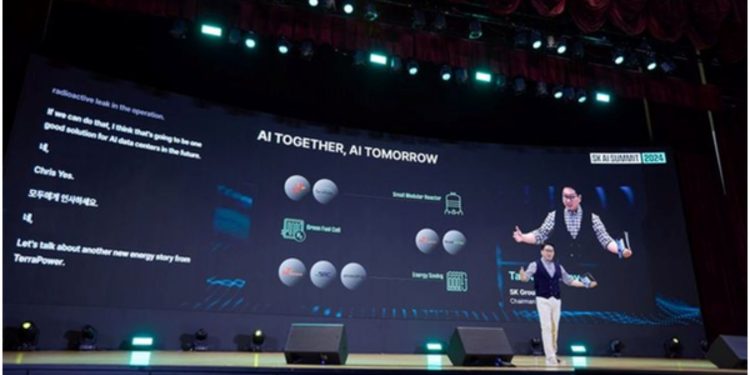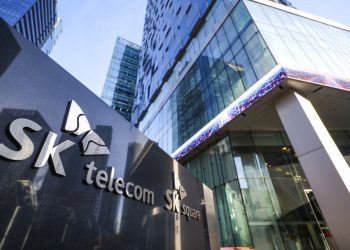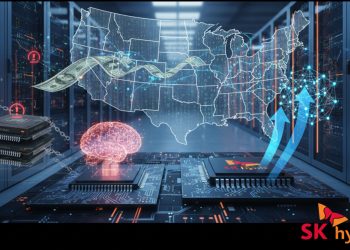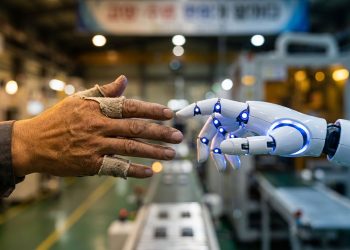The conglomerate’s twin AI events this fall signal an ambition that goes beyond business — toward ecosystem building and global influence.
South Korea’s SK Group is set to make a defining statement in the global artificial intelligence (AI) arena as it prepares to host two high-profile international events — the Future Tech Forum AI at the APEC CEO Summit in Gyeongju on October 28, and the SK AI Summit 2025 at COEX, Seoul, from November 3 to 4.
Together, these gatherings aim not only to showcase technological innovation but also to frame Korea’s emerging role as a bridge between industrial transformation and AI governance. For SK Group, the events are a strategic opportunity to position itself — and the nation — as central players in shaping the next chapter of AI development.
Thematic Focus: “AI Now & Next”
The SK AI Summit 2025, themed “AI Now & Next,” will explore the dual imperatives of harnessing AI’s current capabilities and preparing for its long-term evolution. It will spotlight SK’s progress in critical areas such as semiconductors, AI infrastructure, energy-efficient data centers, and AI agent services, reflecting the conglomerate’s deepening commitment to technological transformation.
Last year’s edition drew more than 30,000 participants, underscoring the summit’s growing reputation as a serious platform for global dialogue. This year, the agenda goes a step further — focusing not only on innovation but also on the socio-economic implications of widespread AI adoption.
Chey Tae-won’s Vision: AI as a Driver of Industrial Reinvention
In his keynote, SK Group Chairman Chey Tae-won is expected to outline the conglomerate’s long-term AI vision, emphasizing both economic impact and social responsibility. At the heart of his address will be the concept of “Manufacturing AI” — the integration of AI technologies into production and industrial workflows to enhance efficiency, product quality, and global competitiveness.
Chey’s stance aligns with SK’s broader strategy of transforming Korea’s industrial base through AI-driven innovation. His speech, themed “AI Now & Next,” will likely underscore how technological advancement must translate into tangible social and economic value.
According to SK insiders, Chey intends to advocate for a balance between rapid innovation and responsible deployment, ensuring AI serves as a growth engine without exacerbating inequality or ethical risks.
Industry Heavyweights Take the Stage
The 2025 summit brings together a formidable roster of global technology leaders and AI pioneers, emphasizing cross-border collaboration. Confirmed speakers include:
- Ben Mann, Co-founder of Anthropic, one of the world’s most influential generative AI companies.
- Tim Costa, Head of Semiconductor Engineering at NVIDIA, a global leader in AI hardware.
- Chung Shin-a, CEO of Kakao, representing Korea’s digital platform ecosystem.
- Ryu Young-sang, CEO of SK Telecom, and Kwak Noh-jung, CEO of SK hynix, highlighting SK’s AI-driven synergy between connectivity and chips.
This diverse lineup signals a deliberate effort to unite AI’s creators, enablers, and implementers on one stage. The discussions will delve into practical integration strategies — from high-bandwidth memory innovations to AI model deployment — as well as the policy and ethical frameworks required to sustain growth responsibly.
Inside SK’s AI Playbook: Data, Chips, and Ecosystems
SK Group has made no secret of its ambition to weave AI through the entire corporate fabric — a strategy encapsulated in what it calls AI Transformation (AIX). This approach embeds AI into core business functions across semiconductors, energy, logistics, and telecommunications.
SK Telecom, for instance, will present updates on AI network automation and agent services. SK hynix will highlight its breakthroughs in high-bandwidth memory (HBM) — a critical component in AI model training. Meanwhile, SK AX is set to showcase integrated AI solutions for energy optimization and digital logistics.
Collectively, these initiatives demonstrate SK’s attempt to create a vertically integrated AI ecosystem — one that spans infrastructure, intelligence, and industry application.
Industry observers note that SK’s focus on “Manufacturing AI” distinguishes it from Silicon Valley’s software-centric AI narrative. By tying AI to hardware, materials, and energy, SK is positioning Korea as a practical testbed for applied AI economics.
Expanding Participation: Startups, Academia, and Cross-Sector Synergy
This year’s summit will extend its reach beyond SK’s corporate circle. Startups, research institutions, and international partners will have a larger role, signaling the group’s intent to democratize the AI conversation.
Startups supported by SK Telecom’s AI accelerator program and university students from SK’s AI talent initiatives will showcase innovations ranging from generative AI prototypes to industrial analytics tools.
Such engagement reflects SK’s understanding that sustainable AI growth requires cross-sector participation. As one participant from last year’s accelerator program put it, “SK’s ecosystem isn’t just about capital. It’s about access — to data, mentors, and real deployment opportunities.”
The Claude Code Builder Hackathon: Co-Creating the Future
A highlight of the 2025 event will be the “Claude Code Builder Hackathon,” co-hosted by SK Telecom, Anthropic, and Coxwave. The hackathon will gather developers and researchers to build new AI solutions using Anthropic’s Claude models, fostering a collaborative environment for real-time innovation.
Anthropic Co-founder Ben Mann will reportedly engage directly with participants, offering insights into how generative AI can move from experimentation to enterprise adoption. The event is expected to function as both a talent discovery platform and a live innovation lab for cross-border AI problem-solving.
Future Tech Forum AI: Linking Policy and Innovation
Ahead of the Seoul summit, SK Group will organize the Future Tech Forum AI on October 28 as a side event of the APEC CEO Summit in Gyeongju. Unlike the Seoul summit’s corporate focus, this forum will address policy and ecosystem-level challenges.
The forum’s theme — “Building a National AI Ecosystem” — emphasizes cooperation among government, academia, and the private sector. Chey Tae-won, who also serves as Chair of the APEC CEO Summit, will open the event with a keynote on Korea’s AI governance model and the importance of international alignment in AI safety and ethics.
Notable speakers include:
- Matt Garman, CEO of Amazon Web Services
- Choi Soo-yeon, CEO of Naver
- Kim Kyung-hoon, Head of OpenAI Korea
- Yejin Choi, Professor at Stanford University
- Nitin Mittal, Global AI Leader at Deloitte Consulting
Their participation reinforces Korea’s growing role as a policy influencer in global AI standards, not just a technology producer.
Korea’s Strategic Bet on AI
Together, the Future Tech Forum AI and the SK AI Summit 2025 reveal a unified national strategy: integrating industrial innovation with governance leadership.
For SK Group, these events are more than brand showcases — they are part of a deliberate push to build Korea’s AI sovereignty through technology, talent, and partnerships. For South Korea, they represent a broader attempt to anchor itself at the heart of the global AI revolution — where policy, production, and innovation converge.
As the world’s largest technology companies look east for collaboration, Seoul’s November summit may well mark the point where Korea transitions from being an adopter of global AI trends to an architect of their future.







